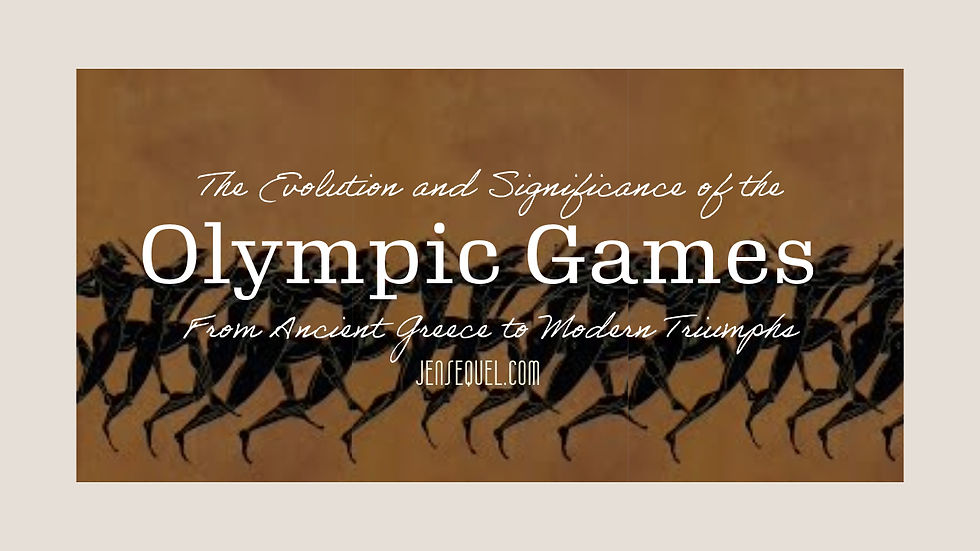The Evolution and Significance of the Olympic Games: From Ancient Greece to Modern Triumphs
- Jen Sequel
- Jul 29, 2024
- 4 min read

The Olympic Games, a symbol of international unity and athletic prowess, trace their origins back to ancient Greece. This grand tradition began as a festival honoring Zeus, the king of the Greek gods, and has evolved over millennia to become a global celebration of sportsmanship and human achievement. Today’s entry delves into the earliest recorded Olympic Games, their evolution through the ages, the historic triumphs for women's rights, and their continued relevance in today's world.
The Earliest Recorded Olympic Games

The earliest recorded Olympic Games date back to 776 BCE, held in Olympia, Greece. These ancient sporting games were a religious festival dedicated to Zeus and took place every four years. Olympia was only one out of four locations; however, it was the most famous. The other sporting festivals included the Pythian Games at Delphi; the Nemean Games at Nemea; and the Isthmian Games, held near Corinth. Later, similar festivals were held in nearly 150 cities as far afield as Rome, Naples, Odessus, Antioch, and Alexandria.
The original events included running races, long jump, shot put, javelin, boxing, pankration (a blend of wrestling and boxing), and equestrian events. Victors were awarded olive wreaths, and their names were immortalized in history. These games were not just athletic contests but also a means to honor the gods, demonstrate physical prowess, and foster unity among the often-warring Greek city-states.
The Significance of the Games

The Olympic Games held immense cultural and religious significance. They were a unifying force, bringing together athletes from various Greek city-states, who competed not only for personal glory but also for the honor of their homeland. The games were an opportunity for Greeks to showcase their physical abilities and to worship Zeus through athletic excellence.
In addition to religious reverence, the games promoted values such as fair competition, discipline, and excellence. They were a testament to the Greek ideal of a sound mind in a sound body, emphasizing the importance of physical fitness and mental strength.
The First Woman Winner in Ancient Times

In the male-dominated world of ancient Greek sports, women were largely excluded from participating in or even attending the Olympic Games (though there is controversary over this and some speculate there may have been errors in the translation regarding women as spectators). However, a notable exception was Cynisca (or Kyniska), a Spartan princess who made history by becoming the first woman to win an Olympic event. In 396 BCE and again in 392 BCE, Cynisca won the chariot racing events. Although women were not allowed to compete directly, they could enter horses in the races. The awards went to the horse trainers and not the one driving the chariot. Cynisca's victories were groundbreaking.
Cynisca's achievements challenged societal norms and demonstrated that women could also achieve greatness in the realm of sports. Her victories paved the way for future generations of female athletes.
The Evolution of the Olympic Games

The ancient Olympic Games continued until 393 CE when the Roman Emperor Theodosius I abolished them, viewing them as a pagan ritual. The modern revival of the Olympics began in 1896, spearheaded by Pierre de Coubertin, a French educator and historian. The first modern Olympic Games were held in Athens, Greece, symbolically reconnecting the present with the ancient past.
Since then, the Olympics have grown in scope and scale, incorporating athletes from all over the world and expanding the range of sports. The games have evolved to include both Summer and Winter Olympics, with the first Winter Games held in 1924 in Chamonix, France.
Triumphs for Women's Rights Through the Ages
The inclusion of women in the Olympic Games has been a gradual and hard-fought process. Women were first allowed to compete in the 1900 Paris Olympics, although only in a limited number of sports such as tennis and golf. Over the decades, the number of sports and events open to women has steadily increased, reflecting broader societal changes and advancements in women's rights.
One significant milestone was the 2012 London Olympics, where, for the first time, every participating country included female athletes. Additionally, women's boxing was introduced, marking the inclusion of women in every Olympic sport.
The triumphs of female athletes like Wilma Rudolph, Nadia Comăneci, and Simone Biles have inspired countless women and girls to pursue their dreams in sports. These athletes have not only broken records but also shattered stereotypes and paved the way for future generations.
The Relevance of the Olympics Today

Today, the Olympics remain a powerful symbol of global unity, bringing together athletes from diverse backgrounds to compete in the spirit of friendship and fair play. The games promote values such as excellence, respect, and equality, transcending political and cultural differences.
The Olympics provide a platform for addressing social issues, such as gender equality and inclusivity. The inclusion of new sports and events reflects the dynamic nature of the games, adapting to the changing interests and passions of the global audience.
Moreover, the Olympics inspire millions worldwide, fostering a sense of shared humanity and collective aspiration. They celebrate the pinnacle of human physical achievement and the indomitable spirit of athletes who push the boundaries of what is possible.
From their origins as a religious festival in ancient Greece to the modern spectacle of international sportsmanship, the Olympic Games have undergone a remarkable evolution. They have championed the cause of women's rights and continue to adapt to the changing times. The Olympics remain relevant today, serving as a beacon of hope, unity, and excellence in an increasingly interconnected world. As we look forward to future games, we can celebrate the enduring legacy of the Olympics and the remarkable achievements they inspire.





Comments